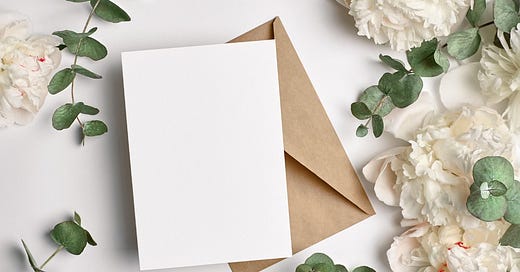Quotes of the week
“A letter always seemed to me like immortality because it is the mind alone without corporeal friend.”
― Emily Dickinson
“To write is human, to receive a letter: Divine!”
― Susan Lendroth
Hello,
This week I have been thinking about letters. How wonderful it was to receive a letter from family and friends. These days the only thing we get in the mailbox is possibly bills (if they are not automatically paid), and one or two free magazines full of commercials. Everything is done via e-mail. It is also nice in a way, because you have instant access to family and friends, but it is not exactly the same.
Hercule Poirot and the delivering of letters
The idea of receiving letters occurred to me while bing watching the 13 seasons of the Hercule Poirot tv-series with David Suchet as the man himself. I was fascinated by the fact that they received letters twice a day. Often Poirot asked if the letter came by morning or evening post. What a service in those days (I think these stories take place during the 1920s and 1930s). It seems that the second daily delivery of mail in Britain was abandoned in 2004, in order to reduce costs. Today, at least here in Sweden where I live, they only deliver post every other day.
This Is My Letter To The World
This is my letter to the world,
That never wrote to me,--
The simple news that Nature told,
With tender majesty.
Her message is committed
To hands I cannot see;
For love of her, sweet countrymen,
Judge tenderly of me!
Emily Dickinson’s poem is about isolation and communication. Her ‘letter’ is adressed to the world, meaning it will never be sent off or read. It might reflect her own isolation and seclusion from society. A beautiful poem that speaks of longing for something out of reach. The idea of the poem is probably still valid from some people. Just because we have these fast communications, it does not mean that all people are included.
Correspondence to be enjoyed
The problem today, when most correspondence is held via e-mail, is that we don’t have any collections of letter writing anymore. We can still enjoy letters from authors, politicians, artists, and others in the past. But, for how long? I really enjoy seeing films, or tv-series, where a person open a small box, or drawer, and take out a bunch of letters, often with a ribbon tied around it. To be frank, it mostly happens in the movies, and not so much in real life. But still … I would love to find a bunch like that.
Letters give an insight, not only of a private life, but of a profession, politics at the time and a diversity of other subjects. There are many published letters from interesting persons, here just a few.
Benjamin Franklin (1706-1790) (one of the most frequent letter writers ever. He corresponded with both men and women, from America to Great Britain and Europe.)
Lord Byron (considered the greatest letter-writer in English literature. He wrote letters from the age of 10 in 1798 until a few days before he died in 1824).
George Orwell (wrote extensive letters through his life covering his time).
P.G. Woodhouse (would they be as amusing as his books?).
Anais Nin & Henry Miller (one of the great literary love affairs of all time, also including letters after the affair was over).
F. Scott Fitzgerald (a life time of letters from his youth to later in life).
Graham Greene (his letters cover his interesting and varied career in literature and politics).
A friendship in letters
One of the most popular books in recent years is 84, Charing Cross Road by Helen Hanff. It was published in 1970 and based on her twenty-year correspondence with Frank Doel, the chief buyer of Marks & Co antiquarian booksellers in London.
Helen Hanff was searching for British literature classics. Unable to find them in New York City she contacted the shop in London in 1949, after having seen an ad in Saturday Review of Literature. Her letters ended up at Frank Doel’s desk. As their correspondence continued a friendship by letters developed between the two, as well as with other staff members. Even extending to Christmas, and birthday gifts and food parcels to the staff after World War II food shortages.
Subjects, high and low were discussed in their correspondence. Hanff planned to visit Doel and the bookshop for a long time. When she finally went it was too late. Doel died in 1968, and the bookshop closed in 1970. Hanff did visit in 1971, but then all she saw was an empty bookshop. Her book The Duchess of Bloomsbury Street cover this trip. The book was made into a film in 1987, and Hanff and Doel are perfectly portrayed by Anne Bancroft and Anthony Hopkins. Well worth both reading the book and watching the movie. Keep your handkerchief close by. This story shows how a letter correspondence can give you new friends, and change your life.
On my blog this week
I do have a book of letters which I read during November. It is Rainer Maria Rilke’s Letters to a Young Poet. You find a few lines about it in November Wrap-up.
Do you enjoy writing letters? I presume everyone likes to receive letters? Do you enjoy reading other people’s letters. And I don’t mean that you should look into the drawers of family and friends, more like finding published letter of a person that you favour. Please let me know.






That is a lovely quote. I used to write lots of letters. Nowadays, I often send them out by e-mail, however, I still love sending cards, as you might know.